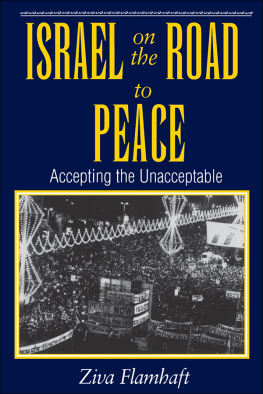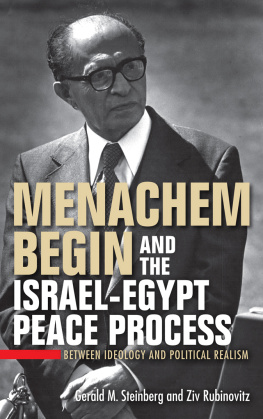Israel on the Road to Peace
First published 1996 by Westview Press
Published 2018 by Routledge
711 Third Avenue, New York, NY 10017, USA
2 Park Square, Milton Park, Abingdon, Oxon OX14 4RN
Routledge is an imprint of the Taylor & Francis Group, an informa business
Copyright 1996 Taylor & Francis
All rights reserved. No part of this book may be reprinted or reproduced or utilised in any form or by any electronic, mechanical, or other means, now known or hereafter invented, including photocopying and recording, or in any information storage or retrieval system, without permission in writing from the publishers.
Notice:
Product or corporate names may be trademarks or registered trademarks, and are used only for identification and explanation without intent to infringe.
A CIP catalog record for this book is available from the Library of Congress.
ISBN 13: 978-0-8133-2774-7 (pbk)
ISBN 13: 978-0-8133-2414-2 (hbk)
To the memory of my parents,
Haya and Tsvi Backman
Peace can in fact be assured only if one or more of the interested powers will make concessions to each other, by lowering their demands or discarding their mutual suspicions. If neither will consent to do this, I do not believe that human wisdom can evolve a scheme to prevent the competing forces from eventually clashing together.
Otto von Bismarck, memorandum (undesignated),
October 20, 1876
Diplomatists are naturally so conservative that, even if once a century they are compelled to take a step forward, they spend a great deal of time and ingenuity in assuring themselves and the world that they have been standing still.
Leonard Woolf, International Government
Jewish and Non-Jewish Population Ratio in Israel and the Territories, 1967-1990
Non-Jewish Population Growth in Judea, Samaria, and Gaza, 1967-1990
Parties Elected in Israel in 1981-1992, with Number of Seats in the Knesset
In the process of writing this volume, I benefited from the assistance of a number of individuals. Special thanks are due to Professors Dankwart A. Rustow and Asher Arian for their support and scholarly guidance and to Professors Abraham Bargman and Irving Markovits for their comments and suggestions. I am grateful as well to Ambassador Seymour M. Finger and Professors Benjamin Rivlin and W. Ofuatey-Kodjoe for their remarks.
I also thank Brigadier General (res.) Aharon Levran; Ambassador Samuel Lewis; former assistant secretary of state for Near Eastern and African affairs Richard Murphy; the former Israeli health minister and current mayor of Jerusalem, Ehud Olmert; member of Knesset and current foreign minister of Israel, Shimon Peres; former member of Knesset and current president of Israel, Ezer Weizman; and Professor I. William Zartman, who were kind enough to take time from their busy schedules to speak with me.
I owe particular thanks to my husband, Stephen, and my daughter, Odellia, without whose patience, support, and understanding I could not have taken on this project.
Ziva Flamhaft
This book went to press shortly after the tragic assassination of Prime Minister Yitzhak Rabin at a Tel Aviv peace rally on November 4, 1995. The killer, a twenty-five year old Israeli hard-liner, was reportedly a member of Eyal, an obscure, Jewish, right-wing, underground militant group founded in 1990 by members of the Kach movement, the latter banned in 1994. The horrendous act of the assassin, which apparently enjoyed the blessing of a number of ultra-nationalist rabbis, induced tremendous outrage against extremist groups in Israel and enormous support for the peace process. Evidently, the assassination was meant to stop the implementation of the Israeli-Palestinian Interim Agreement on the West Bank and Gaza Strip, also known as Oslo II, which was approved by Rabins cabinet on September 27, 1995, signed in Washington on September 28, and ratified by the Knesset on October 6 by a vote of 61 to 59. If implemented, it would relinquish less than one-third of the West Bank to Palestinian control.
The agreement was structured to broaden Palestinian self-rule in the West Bank for an interim period not exceeding five years from the signing of the Gaza-Jericho agreement (no later than May 1999). It set the timetable for the permanent status negotiations to begin no later than May 1996, two months after the Israeli Defense Forces are scheduled to complete their redeployment from the last West Bank city. In his comprehensive speech to the Knesset upon the agreements ratification, Rabin reassured the country that, among other things, the permanent solution would ensure that greater Jerusalem would remain united under Israeli sovereignty and that the borders of the State of Israel would extend beyond the 1967 lines to include most of the Land of Israel as it was under the rule of the British mandate. He admitted, however, that withdrawal from the 1967 lines was necessary in order to preserve the Jewish and democratic nature of the State of Israel and its security.
Will Rabins vision prevail after his untimely death? Can the peace process survive the deep cleavages appearing in Israeli society? Can the Labor government implement its agreement with the PLO amid the shock and grief engulfing the country? No, say those who believe that Rabin, the warrior who led the IDF to its stunning victory over the Arab armies in 1967 and the defense minister who did not hesitate to use the harshest of measures to quell the intifada, was the only Labor leader who had sufficient credibility to trade territory for peace with the PLO. Additionally, they argue that Israeli society, already so divided over the peace process, has been further wrenched apart by Rabins assassination. Moreover, the massive campaign of terror launched by Hamas as Israel and the PLO move closer to the permanent status negotiations has jeopardized the future of the peace process altogether. Others, however, believe that since peace remains the only option for both Israel and the Palestinians, the assassination will draw many indecisive Israelis toward the Labor government and that the peace process will be enhanced in spite of the setback inflicted by the Hamas reign of terror. I share this view.
It is not clear whether, or to what extent, Rabins murderer was influenced by the venomous rhetoric that has characterized the controversy over the peace process since the signing of the Declaration of Principles in September 1993. But if it is possible that the virulent language that consumed the political discourse in Israel legitimized the use of violence against Israeli officials, and Rabins murder in particular, many Israelis would consider it a moral imperative to realize Rabins objectives. And although some members of the Israeli right would argue that Rabin provoked settlers and other right-wing nationalists by alienating them, most Israelis must question why they remained silent when the rights criticism of the Labor governments policies turned into personal and vicious attacks against the prime minister, including accusations of being a traitor and murderer, deserving punishment by death. Similarly, most Israelis must question why they remained apathetic when Rabin, the soldier and statesman who had faithfully served his country since before independence, was portrayed as an Arab or even as a Gestapo officerthe worst insult in a country that was created out of the ashes of the Holocaust. Indeed, 74 per cent of those Israelis who were surveyed on November 10, 1995, by Yediot Aharonot











